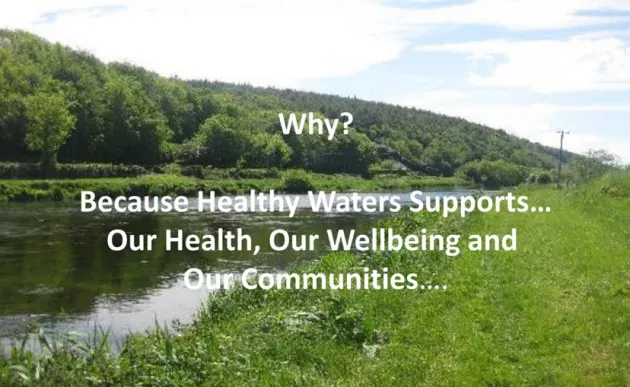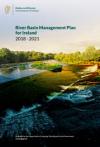EU Water Framework Directive
The EU Water Framework Directive was adopted in October 2000 (Directive 2000/60/EC) and signalled a change of thinking in the way that water issues are addressed.

The Directive commits member states to preventing deterioration and achieving at least good status in our rivers, lakes, estuaries, coastal and ground waters by 2027 and to ensure the long-term sustainable use of water. This is to be achieved through catchment-based river basin management planning.
Member States are obliged to produce River Basin Management Plans (RBMPs) that, amongst other things, set out a programme of measures to protect and restore water quality and ultimately meet the directive’s objectives. The first river basin management planning cycle covered 2009-2015. This second cycle plan covers 2016-2021 with a third planning cycle covering the period 2022-2027.
2018 - 2021 River Basin Management Plan
Mr. Eoghan Murphy, TD, Minister for Housing, Planning, Community and Local Government, published the River Basin Management Plan (RBMP) for Ireland 2018-2021 on 17th April 2018.
The plan has been published following three formal phases of public consultation, over 120 town hall meetings, over 2,000 submissions from interested parties, and meetings with representative bodies and stakeholders.
Some of the main actions that will be undertaken by the RBMP are listed below.
- The plan sets out the measures that are required to protect our water bodies.
- It addresses the pressures on those water bodies which are at risk of not meeting the objectives of the Water Framework Directive.
- In its implementation it concentrates on (a) prioritising certain bodies of water for action and (b) delivering positive environmental outcomes by means of intervention co-ordinated across a range of stakeholders.
- Based on scientific evidence from the Environmental Protection Agency (EPA), it prioritises a total of 190 ‘Areas for Action’ across the country.
- Within the Dublin City Council administrative area, the plan identifies the the Santry/Mayne and Dodder sub-catchments as prioritised water bodies or ‘areas for action’ within the second cycle RBMP.
Dublin City Council Water Framework Division Office
The Water Framework Directive Office in Dublin City Council was set up to co-ordinate and implement measures to improve our natural waters as outlined in the National River Basin Management Plan. Our main objective is to improve water quality and enhance our aquatic environment in partnership with all stakeholders, including local communities, other agencies and internal Dublin City Council departments. The WFD office consists of a team of engineers, scientists, spatial planners, GIS professionals and administrators. We have a broad knowledge base and come from varied backgrounds including community, regulation, surveying, strategic planning and civil, structural and environmental engineering.
A natural river environment combined with good water quality is vital for diverse and rich aquatic habitats and these characteristics are also a key cornerstone for enriched biodiversity, increased climate and flood resilience and enhanced public amenity features.
We are involved in many ongoing and proposed projects to achieve the objectives of the Water Framework Directive and this is your chance get involved!
You can:-
- Create your own rainwater planter or rain garden at home, work or school.
- Join your local river or environmental group and participate in river clean ups or citizen science projects. For further information on community groups in your area contact your Local Community Water Officer, Thomas Carolan - [email protected]
- Ensure proper disposal of Fats, Oils and Greases.
- Ensure proper disposal of grass cuttings away from watercourses.
- Choose to grow plants that promote and benefit biodiversity.
- Preserve a “wild buffer zone” adjacent to rivers.
- Use a water butt to conserve water for your garden.
- Follow the ‘Think before you Flush’ campaign.
- Wash your car at the local garage or on vegetated areas.
- Have your say and contact the DCC WFD Office at [email protected] or find more information on your local waterbody at www.catchments.ie
We can only achieve this by working together
Improving water quality: what you can do
Water quality is both a local and a national issue. Local knowledge and actions can have a powerful positive effect on water quality in rivers, lakes and coastal waters. The Local Authorities Water Community Office (LAWCO) is working with local groups and communities to help them play their part in protecting our waters.
To find out how you can get involved, contact: LAWCO (http://watersandcommunities.ie) T: 0761 065 262.
More information on water quality
To get information about water quality in your local area or water quality activities throughout the country, visit the EPA's Catchments website (https://www.catchments.ie/) The website contains guidance, maps, data, resources, case studies and water-related news from around Ireland. You can also sign up for a quarterly Catchments Newsletter and for updates about relevant events in your county.





